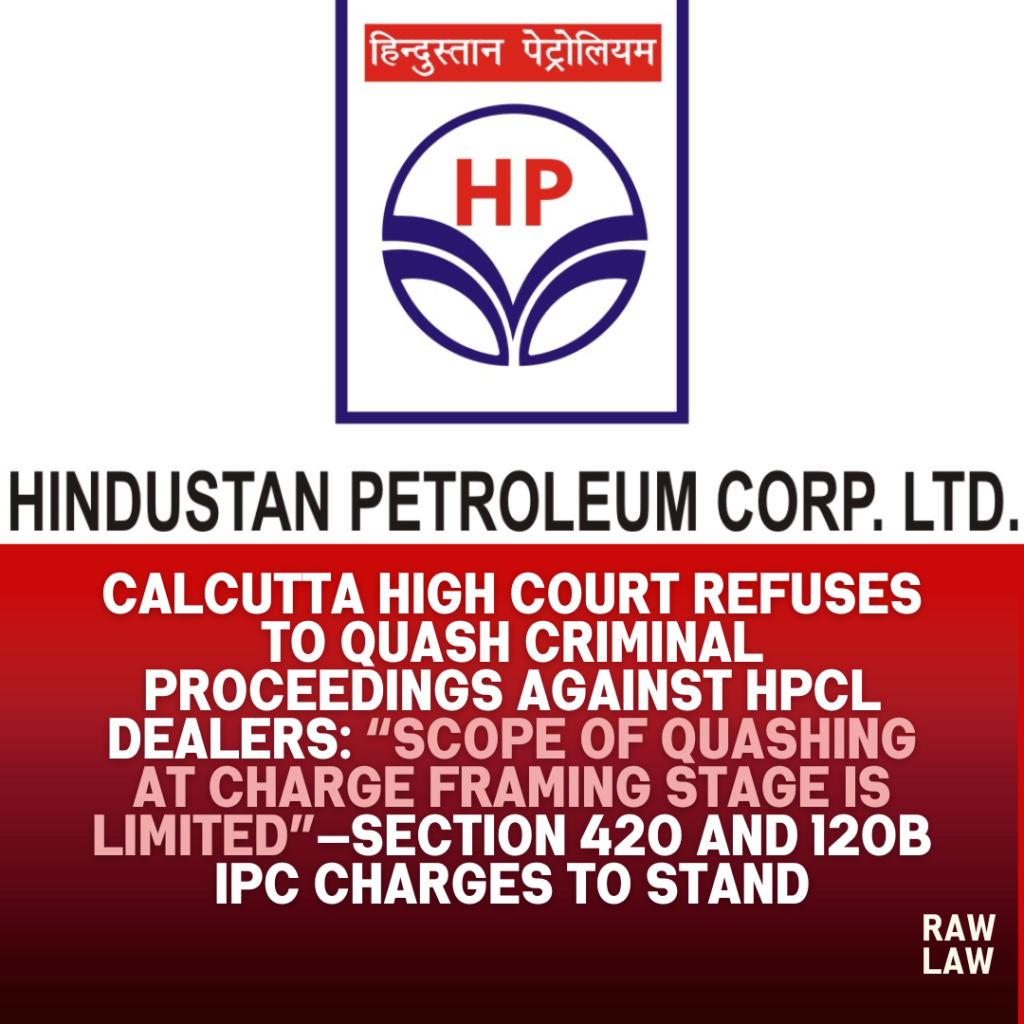Judgment Name: Hindustan Petroleum Corporation Limited v. State of West Bengal & Ors.
Date: 17 June 2025
Coram: Justice Dr. Ajoy Kumar Mukherjee, Calcutta High Court
Court’s Decision
The Calcutta High Court dismissed the revisional application filed by Hindustan Petroleum Corporation Limited (HPCL) and others seeking to quash proceedings under Sections 420 and 120B of the IPC. The Court held that at the stage of framing of charge, only a prima facie case is to be looked at, and deeper evaluation of evidence is not permissible. It ruled that the FIR, charge sheet, and accompanying materials disclosed sufficient grounds to proceed against the petitioners and refused to interfere.
“At the stage of framing charge… if there is ground for presuming that the accused has committed an offence, the Court shall proceed.”
Facts
The case arose from a complaint lodged by an authorized dealer of HPCL, who alleged that despite successfully completing the dealership selection process and infrastructural development for the retail outlet, HPCL arbitrarily and unilaterally cancelled the Letter of Intent (LOI) and awarded the dealership to another party. The complainant further alleged that this was done in collusion with HPCL officers and the new dealer, resulting in cheating and loss.
The police, after investigation, filed a charge sheet under Sections 420 and 120B IPC. The petitioners (HPCL and its officers) moved the High Court under Section 482 CrPC and Article 227 of the Constitution seeking to quash the entire proceedings.
Issues
- Whether the FIR and charge sheet disclosed a prima facie offence under Sections 420 and 120B IPC.
- Whether the continuation of criminal proceedings would amount to abuse of process of law.
- Whether the criminal case could be quashed at the stage of framing of charge when trial had not commenced.
Petitioner’s Arguments
The petitioners submitted that:
- The allegations related to breach of contractual obligations and did not amount to a criminal offence.
- The complainant had already approached the civil court and the dispute was sub judice in a pending civil suit.
- The charge sheet was based solely on conjectures and hearsay, lacking any credible evidence.
- The complainant had not disclosed how the petitioners had made dishonest representations to induce him to act to his detriment.
- The dealership was cancelled in accordance with company policy and procedures.
Respondent’s Arguments
The State opposed the prayer for quashing and submitted that:
- The FIR, investigation, and charge sheet clearly made out a prima facie case of cheating and conspiracy.
- There was evidence to show that the complainant was induced to invest significant sums of money and develop infrastructure based on the LOI issued by HPCL, which was subsequently cancelled without adequate reason.
- The petitioners acted in collusion with a third party to unfairly deprive the complainant of the dealership.
Analysis of the Law
The Court reiterated that at the charge framing stage, the standard is whether there is sufficient ground for presumption of commission of an offence. The Court relied on the principle that:
“At the stage of charge, the Court is not required to go into the probative value of the materials. It is sufficient if there is a strong suspicion.”
It also distinguished civil breach of contract from criminal intent by holding that allegations in the FIR, if taken on their face value, suggest dishonest intention on the part of the accused from the very beginning.
Precedent Analysis
The Court implicitly applied legal standards laid down in:
- State of Haryana v. Bhajan Lal – On the limited grounds for quashing criminal proceedings.
- R.P. Kapur v. State of Punjab – On the narrow scope of Section 482 CrPC in interfering with pending criminal proceedings.
- State of Bihar v. P.P. Sharma – On distinguishing civil disputes from criminal offences at the pre-trial stage.
While these were not expressly cited, the judicial reasoning was consistent with their doctrines.
Court’s Reasoning
Justice Mukherjee concluded that:
- The complainant had made out specific allegations of dishonest inducement, coupled with loss suffered.
- The materials in the case diary and charge sheet could not be disbelieved at this preliminary stage.
- The criminal proceeding could not be quashed merely because a civil suit was pending on the same subject matter.
He held:
“It cannot be said that no prima facie case is made out… hence the prayer for quashing charge sheet and FIR is rejected.”
Conclusion
The Court dismissed the revisional application and allowed the criminal proceedings under Sections 420 and 120B IPC to continue against HPCL and its officers. It directed that the case proceed before the trial court in accordance with law.
Implications
This judgment underscores that corporate actions, even when framed as contractual disputes, may give rise to criminal liability if allegations of dishonesty or conspiracy are made out. It reinforces that courts must not interfere at the threshold of criminal trials unless there is a glaring absence of any criminal element. The judgment serves as a cautionary precedent for public sector undertakings and corporate entities handling contractual obligations.



